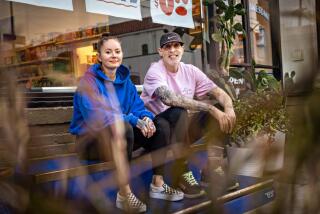JAZZ REVIEW : Fontana: Old-Fashioned Butter, Egg Man
- Share via
NEWPORT BEACH — Carl Fontana is an old-fashioned jazz musician--and that definitely is intended as a compliment.
Friday at the Hyatt Newporter, the Las Vegas-based trombonist, who first gained attention when he played with Stan Kenton and Woody Herman in the ‘50s and ‘60s, showed that the swing-meets-bop style for which he long has been renowned remains solidly in place. His phrases were chock-full of ring-in-your-ear note choices, delivered with a drummer’s flavorful rhythmic sense.
At the same time, relaxation was at the heart of what he played. Wearing a black suit, a multipastel-colored open-necked plaid shirt, a belt with a big silver buckle that said “Carl” and, at least for the first set, dark glasses, Fontana leaned slightly back from the microphone at the Hyatt’s outdoor amphitheater and blew tasty phrases with hardly any body language.
Most of his notes had a fat, buttery quality; they were the aural equivalents of the sensual delight that comes with biting into a warm, delicious piece of toast. He balanced those round, juicy efforts with notes he hit harder, notes that slightly splattered, recalling the happy chatter of eggs frying sunny-side up.
Backed with elan by pianist Lou Levy, bassist Bob Maize and drummer Michael Whited, Fontana selected his repertoire mostly from classic pop standards (one of the exceptions was “Centerpiece,” a blues by Harry “Sweets” Edison that closed the first set).
Fontana’s approach to “Stomping at the Savoy,” the Edgar Sampson tune that was a giant hit for Benny Goodman in the late ‘30s, exemplified the engaging manner with which he worked during the two-hour concert.
He played the familiar melody with a soft, floating sound, adding bite as he segued into his improvisation. He usually stuck with brief statements. Sometimes he’d take a two-, three- or four-note thought and string it together with another similarly shaped idea to create a chain of expression. At other points, he’d just play a short phrase, then pause, and then offer another, concisely and neatly as a knot tied by a sailor.
But he liked to let loose, too. During “Savoy” and elsewhere throughout the show, he unleased long, up-and-down roller-coaster-fast bursts that were startling contrasts to the compact phrases that had come before.
Fontana also enjoyed quoting the melodies of other songs, and his skill at dropping in these phrases at unexpected yet perfectly appropriate moments was uncanny. During “Poinciana,” the concert opener, he played short and punchy over a bouncing vamp invigoratingly provided by the rhythm section--then suddenly stated a bit of Rodgers and Hammerstein’s “Surrey With The Fringe on Top,” and then noodled a tad of Wayne Shorter’s “Nefertiti.”
To “I Wish I Knew,” he added a smidgen of Fats Waller’s “Getting Into Mischief Now.” During “Savoy,” we got a few notes of “Anything Goes,” and during “Night Has a Thousand Eyes,” a snatch of “Jersey Bounce.”
His tuneful work was best on Jerome Kern’s very difficult classic “I Won’t Dance.” Fontana read the melody with the same lilting sort of phrasing that marked Fred Astaire’s splendid vocal debut of the song in the 1935 film “Roberta.” Johnny Mandel’s “Emily” also found Fontana issuing warm, tender lines.
As if to be sure the audience knew just where he stood stylistically, he played Kern’s “I’m Old-Fashioned,” stretching out for his longest improvisation of the evening, seamlessly and sumptuously weaving one idea into another.
Pianist Levy, who leans toward a be-bop approach, was a good partner for Fontana. His vibrant, rhythmic chords combined with Maize and Whited’s support to give the leader a firm platform from which to work.
Levy’s solo efforts centered on his bright sound and his way of surprising a listener as he shifted between single-note lines--so crisply articulated that each note was discernible--dancing chords and sudden sweeps that almost made it seem as though he were playing a harp. His unaccompanied treatment of “Love Walked In,” as he offered a walking bass line and at times mimicked Erroll Garner, was outstanding.
Maize and Whited were a dynamic yet unobtrusive rhythm section. The bassist, one of the finest improvisers on the instrument, delivered several first-class essays.
The concert also featured a handful of vocals from Denver-based Joni Janak. With an appealing alto, rock-solid pitch and a feel for rhythm, she sang “Beautiful Friendship” with appropriate energy, sustaining her notes nicely. On “My Funny Valentine,” she let the emotion in the lyrics fully flower.
More to Read
The biggest entertainment stories
Get our big stories about Hollywood, film, television, music, arts, culture and more right in your inbox as soon as they publish.
You may occasionally receive promotional content from the Los Angeles Times.










